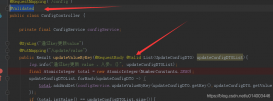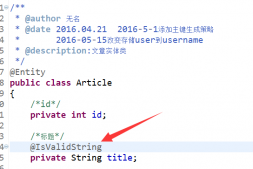Java中的Runnable,Callable,Future,FutureTask的比较
Java中存在Runnable、Callable、Future、FutureTask这几个与线程相关的类或者接口,在Java中也是比较重要的几个概念,我们通过下面的简单示例来了解一下它们的作用于区别。
Runnable
其中Runnable应该是我们最熟悉的接口,它只有一个run()函数,用于将耗时操作写在其中, 该函数没有返回值 。然后使用某个线程去执行该runnable即可实现多线程,Thread类在调用start()函数后就是执行的是Runnable的run()函数。Runnable的声明如下 :
|
1
2
3
4
5
6
7
8
9
10
11
12
13
14
15
|
@FunctionalInterfacepublic interface Runnable { /** * When an object implementing interface <code>Runnable</code> is used * to create a thread, starting the thread causes the object's * <code>run</code> method to be called in that separately executing * thread. * <p> * The general contract of the method <code>run</code> is that it may * take any action whatsoever. * * @see java.lang.Thread#run() */ public abstract void run();} |
Callable
Callable与Runnable的功能大致相似,Callable中有一个call()函数,但是 call()函数有返回值 ,而Runnable的run()函数不能将结果返回给客户程序。Callable的声明如下 :
|
1
2
3
4
5
6
7
8
9
10
|
@FunctionalInterfacepublic interface Callable<V> { /** * Computes a result, or throws an exception if unable to do so. * * @return computed result * @throws Exception if unable to compute a result */ V call() throws Exception;} |
可以看到,这是一个泛型接口,call()函数返回的类型就是客户程序传递进来的V类型。
Future
Executor就是Runnable和Callable的调度容器,Future就是对于具体的Runnable或者Callable任务的执行结果进行取消、查询是否完成、获取结果、设置结果操作。get方法会阻塞,直到任务返回结果(Future简介)。Future声明如下:
|
1
2
3
4
5
6
7
8
9
10
11
12
13
14
15
16
17
18
19
20
21
22
23
24
25
26
27
28
29
30
31
32
33
34
35
36
37
38
39
40
41
42
43
44
45
46
47
48
49
50
51
52
53
54
55
56
57
58
59
60
61
62
63
64
65
66
67
68
69
70
71
72
73
74
75
76
77
78
79
80
|
* @see FutureTask * @see Executor * @since 1.5 * @author Doug Lea * @param <V> The result type returned by this Future's {@code get} method */public interface Future<V> { /** * Attempts to cancel execution of this task. This attempt will * fail if the task has already completed, has already been cancelled, * or could not be cancelled for some other reason. If successful, * and this task has not started when {@code cancel} is called, * this task should never run. If the task has already started, * then the {@code mayInterruptIfRunning} parameter determines * whether the thread executing this task should be interrupted in * an attempt to stop the task. * * <p>After this method returns, subsequent calls to {@link #isDone} will * always return {@code true}. Subsequent calls to {@link #isCancelled} * will always return {@code true} if this method returned {@code true}. * * @param mayInterruptIfRunning {@code true} if the thread executing this * task should be interrupted; otherwise, in-progress tasks are allowed * to complete * @return {@code false} if the task could not be cancelled, * typically because it has already completed normally; * {@code true} otherwise */ boolean cancel(boolean mayInterruptIfRunning); /** * Returns {@code true} if this task was cancelled before it completed * normally. * * @return {@code true} if this task was cancelled before it completed */ boolean isCancelled(); /** * Returns {@code true} if this task completed. * * Completion may be due to normal termination, an exception, or * cancellation -- in all of these cases, this method will return * {@code true}. * * @return {@code true} if this task completed */ boolean isDone(); /** * Waits if necessary for the computation to complete, and then * retrieves its result. * * @return the computed result * @throws CancellationException if the computation was cancelled * @throws ExecutionException if the computation threw an * exception * @throws InterruptedException if the current thread was interrupted * while waiting */ V get() throws InterruptedException, ExecutionException; /** * Waits if necessary for at most the given time for the computation * to complete, and then retrieves its result, if available. * * @param timeout the maximum time to wait * @param unit the time unit of the timeout argument * @return the computed result * @throws CancellationException if the computation was cancelled * @throws ExecutionException if the computation threw an * exception * @throws InterruptedException if the current thread was interrupted * while waiting * @throws TimeoutException if the wait timed out */ V get(long timeout, TimeUnit unit) throws InterruptedException, ExecutionException, TimeoutException;} |
FutureTask
FutureTask则是一个RunnableFuture< V>,而RunnableFuture实现了Runnbale又实现了Futrue< V>这两个接口:
|
1
2
3
|
public class FutureTask<V> implements RunnableFuture<V> {......} |
RunnableFuture
|
1
2
3
4
5
6
7
8
9
10
11
12
13
14
15
16
17
|
/** * A {@link Future} that is {@link Runnable}. Successful execution of * the {@code run} method causes completion of the {@code Future} * and allows access to its results. * @see FutureTask * @see Executor * @since 1.6 * @author Doug Lea * @param <V> The result type returned by this Future's {@code get} method */public interface RunnableFuture<V> extends Runnable, Future<V> { /** * Sets this Future to the result of its computation * unless it has been cancelled. */ void run();} |
另外FutureTask还可以包装Runnable和Callable< V>, 由构造函数注入依赖。
|
1
2
3
4
5
6
7
8
9
10
11
12
13
14
15
16
17
18
19
20
21
22
23
24
25
26
27
28
29
30
|
/** * Creates a {@code FutureTask} that will, upon running, execute the * given {@code Callable}. * * @param callable the callable task * @throws NullPointerException if the callable is null */ public FutureTask(Callable<V> callable) { if (callable == null) throw new NullPointerException(); this.callable = callable; this.state = NEW; // ensure visibility of callable } /** * Creates a {@code FutureTask} that will, upon running, execute the * given {@code Runnable}, and arrange that {@code get} will return the * given result on successful completion. * * @param runnable the runnable task * @param result the result to return on successful completion. If * you don't need a particular result, consider using * constructions of the form: * {@code Future<?> f = new FutureTask<Void>(runnable, null)} * @throws NullPointerException if the runnable is null */ public FutureTask(Runnable runnable, V result) { this.callable = Executors.callable(runnable, result); this.state = NEW; // ensure visibility of callable } |
可以看到,Runnable注入会被Executors.callable()函数转换为Callable类型,即FutureTask最终都是执行Callable类型的任务。该适配函数的实现如下 :
|
1
2
3
4
5
6
7
8
9
10
11
12
13
14
15
16
|
/** * Returns a {@link Callable} object that, when * called, runs the given task and returns the given result. This * can be useful when applying methods requiring a * {@code Callable} to an otherwise resultless action. * @param task the task to run * @param result the result to return * @param <T> the type of the result * @return a callable object * @throws NullPointerException if task null */ public static <T> Callable<T> callable(Runnable task, T result) { if (task == null) throw new NullPointerException(); return new RunnableAdapter<T>(task, result); } |
RunnableAdapter适配器
|
1
2
3
4
5
6
7
8
9
10
11
12
13
14
15
|
/** * A callable that runs given task and returns given result */ static final class RunnableAdapter<T> implements Callable<T> { final Runnable task; final T result; RunnableAdapter(Runnable task, T result) { this.task = task; this.result = result; } public T call() { task.run(); return result; } } |
由于FutureTask实现了Runnable,因此它既可以通过Thread包装来直接执行,也可以提交给ExecuteService来执行。并且还可以直接通过get()函数获取执行结果,该函数会阻塞,直到结果返回。
因此FutureTask既是Future、Runnable,又是包装了Callable(如果是Runnable最终也会被转换为Callable ), 它是这两者的合体。
完整示例:
|
1
2
3
4
5
6
7
8
9
10
11
12
13
14
15
16
17
18
19
20
21
22
23
24
25
26
27
28
29
30
31
32
33
34
35
36
37
38
39
40
41
42
43
44
45
46
47
48
49
50
51
52
53
54
55
56
57
58
59
60
61
62
63
64
65
66
67
68
69
70
71
72
73
74
75
76
77
78
79
80
81
82
83
84
85
86
87
88
89
90
91
92
93
94
95
96
97
98
99
100
101
102
103
104
105
106
107
108
109
110
111
112
113
114
115
116
117
118
119
120
121
122
123
124
125
126
127
128
129
130
131
132
133
134
135
136
137
138
139
140
141
142
143
144
145
146
147
148
149
150
|
package com.stay4it.rx;import java.util.concurrent.Callable;import java.util.concurrent.ExecutionException;import java.util.concurrent.ExecutorService;import java.util.concurrent.Executors;import java.util.concurrent.Future;import java.util.concurrent.FutureTask;public class FutureTest { public static class Task implements Runnable { @Override public void run() { // TODO Auto-generated method stub System.out.println("run"); } } public static class Task2 implements Callable<Integer> { @Override public Integer call() throws Exception { System.out.println("call"); return fibc(30); } } /** * runnable, 无返回值 */ public static void testRunnable(){ ExecutorService executorService = Executors.newCachedThreadPool(); Future<String> future = (Future<String>) executorService.submit(new Task()); try { System.out.println(future.get()); } catch (InterruptedException e) { // TODO Auto-generated catch block e.printStackTrace(); } catch (ExecutionException e) { // TODO Auto-generated catch block e.printStackTrace(); } executorService.shutdown(); } /** * Callable, 有返回值 */ public static void testCallable(){ ExecutorService executorService = Executors.newCachedThreadPool(); Future<Integer> future = (Future<Integer>) executorService.submit(new Task2()); try { System.out.println(future.get()); } catch (InterruptedException e) { // TODO Auto-generated catch block e.printStackTrace(); } catch (ExecutionException e) { // TODO Auto-generated catch block e.printStackTrace(); } executorService.shutdown(); } /** * FutureTask则是一个RunnableFuture<V>,即实现了Runnbale又实现了Futrue<V>这两个接口, * 另外它还可以包装Runnable(实际上会转换为Callable)和Callable * <V>,所以一般来讲是一个符合体了,它可以通过Thread包装来直接执行,也可以提交给ExecuteService来执行 * ,并且还可以通过v get()返回执行结果,在线程体没有执行完成的时候,主线程一直阻塞等待,执行完则直接返回结果。 */ public static void testFutureTask(){ ExecutorService executorService = Executors.newCachedThreadPool(); FutureTask<Integer> futureTask = new FutureTask<Integer>(new Task2()); executorService.submit(futureTask); try { System.out.println(futureTask.get()); } catch (InterruptedException e) { // TODO Auto-generated catch block e.printStackTrace(); } catch (ExecutionException e) { // TODO Auto-generated catch block e.printStackTrace(); } executorService.shutdown(); } /** * FutureTask则是一个RunnableFuture<V>,即实现了Runnbale又实现了Futrue<V>这两个接口, * 另外它还可以包装Runnable(实际上会转换为Callable)和Callable * <V>,所以一般来讲是一个符合体了,它可以通过Thread包装来直接执行,也可以提交给ExecuteService来执行 * ,并且还可以通过v get()返回执行结果,在线程体没有执行完成的时候,主线程一直阻塞等待,执行完则直接返回结果。 */ public static void testFutureTask2(){ ExecutorService executorService = Executors.newCachedThreadPool(); FutureTask<Integer> futureTask = new FutureTask<Integer>(new Runnable() { @Override public void run() { // TODO Auto-generated method stub System.out.println("testFutureTask2 run"); } },fibc(30)); executorService.submit(futureTask); try { System.out.println(futureTask.get()); } catch (InterruptedException e) { // TODO Auto-generated catch block e.printStackTrace(); } catch (ExecutionException e) { // TODO Auto-generated catch block e.printStackTrace(); } executorService.shutdown(); } public static void main(String[] args) { testCallable(); } /** * 效率低下的斐波那契数列, 耗时的操作 * * @param num * @return */ static int fibc(int num) { if (num == 0) { return 0; } if (num == 1) { return 1; } return fibc(num - 1) + fibc(num - 2); } } |
感谢阅读,希望能帮助到大家,谢谢大家对本站的支持!















